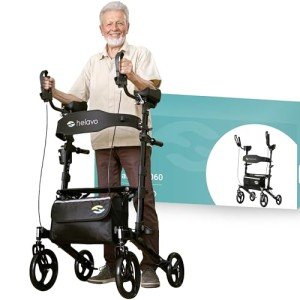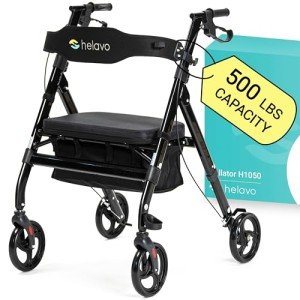You'll Be Unable To Guess Lightweight Walker's Benefits
페이지 정보

본문
The Essential Guide to Lightweight Walkers: A Comprehensive Overview
As life goes on, mobility can typically end up being limited for numerous factors, such as age, injury, or health conditions. For lots of people, having the best mobility aid is necessary for maintaining independence and confidence while moving about. One of the most popular choices offered on the market today is the lightweight walker. In this post, we will dive deep into the world of lightweight walkers, exploring their features, benefits, and factors to consider for picking the best one.
What is a Lightweight Walker?
A lightweight walker is a type of mobility aid created to support individuals who need assistance with walking but require a solution that does not problem them with extreme weight. These walkers are typically made from durable yet lightweight products such as aluminum, making them easy to lift and maneuver. They can substantially improve mobility and promote a sense of self-reliance for users.
Features of Lightweight Walkers
Choosing the ideal lightweight walker includes understanding the different features they provide. The following table describes some typical features and specifications to search for when choosing the ideal walker:
| Feature | Description |
|---|---|
| Material | Often made from aluminum or other lightweight materials for easy mobility. |
| Weight Capacity | Generally supports between 250-350 pounds, but this differs by design. |
| Foldable Design | Numerous lightweight walkers featured a foldable function for easy transport and storage. |
| Height Adjustability | Users can customize the height to make sure convenience and appropriate posture. |
| Hand Grips | Ergonomic handgrips provide included comfort and safety while walking. |
| Wheels | Some models consist of rubberized wheels for smoother mobility, while others are designed without them for a tougher base. |
| Devices | Choices for baskets, trays, or other add-ons to boost functionality. |
Benefits of Using a Lightweight Walker
Lightweight walkers offer many advantages, making them an ideal alternative for those needing mobility assistance. Here are some significant benefits:
Enhanced Mobility: Lightweight walkers enable users to browse through spaces with ease, promoting self-reliance.
Easy to Carry: Their lightweight design enables users to raise and transport them without difficulty.
Stability and Support: Walkers provide a stable base for users, making walking much safer and minimizing the danger of falls.
Improved Posture: The adjustable height feature assists users preserve correct posture while Walking Frame, contributing to long-lasting health.

Personalized Features: Many designs provide a series of devices that can be tailored to fit private requirements.
Price: Compared to other mobility aids, lightweight walkers are frequently more budget-friendly without compromising quality.
Considerations When Choosing a Lightweight Walker
Selecting the ideal lightweight walker involves thinking about different aspects that line up with individual needs. The following list offers essential factors to take a look at:
User's Weight and Height: Ensure the walker can accommodate the user's weight and can be changed for height.
Surface: Consider where the walker will mostly be used (indoor, outdoor, smooth surface areas, unequal terrain).
Functional Needs: Think about any particular requirements such as walking speed, frequency of usage, and wanted features (like baskets or removable seats).
Mobility: Determine whether the walker needs to be quickly portable for trips or trips.
Type of Walker: Decide between basic, wheeled, or Top-Rated Rollator walkers based on the user's balance and walking ability.
Regularly Asked Questions (FAQ)
1. Who should utilize a lightweight walker?
Lightweight walkers are perfect for elderly people, those recovering from injury, or anybody who requires additional support while walking.
2. Just how much do lightweight walkers usually cost?
Rates can differ based on features and brand name. Lightweight walkers can vary from ₤ 50 to ₤ 250, with more Advanced Mobility Aid models costing more.
3. Exist walkers specifically developed for outdoor use?
Yes! Some lightweight walkers come with bigger wheels and more durable building and construction, making them ideal for outdoor terrain.
4. How do I know which height is suitable for the walker?
When using a walker, the user needs to adjust the handgrips to elbow level when their arms are unwinded at their sides, keeping a small bend in the elbows.

5. How frequently should you examine a lightweight walker?
It's excellent practice to inspect the walker for wear and tear regularly. Try to find any loose parts, worn grips, or damaged wheels, specifically if used daily.
In summary, a lightweight walker acts as an invaluable tool for individuals in need of mobility assistance. Its combination of ease-of-use, security, and modification allows users to with confidence engage with their surroundings while preserving independence and individual mobility. When selecting the right Rollator Walker, it's necessary to think about the user's private needs, preferred features, and designated usage.
With different designs available in today's market, potential users can find the perfect lightweight walker that will not only improve their mobility however also improve their total lifestyle. After all, everyone should have the freedom to move with confidence and ease.
- 이전글กรณีศึกษา: การสั่งไวน์ผ่าน Grab ในยุคดิจิทัล 25.10.15
- 다음글It' Onerous Sufficient To Do Push Ups - It's Even Tougher To Do Signup Bonus Poker 25.10.15
댓글목록
등록된 댓글이 없습니다.
